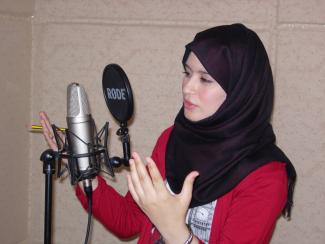Mass media
New international players

For a long time, the major international broadcasters were based in western countries – the BBC in Britain, France24 and RFI in France, the Voice of America and CNN in the USA and Deutsche Welle in Germany. Things are changing. New players have appeared on the international media scene, including the Chinese English-language television network CCTV News and Qatar-based Al Jazeera.
The newcomers’ influence is growing. Money is one reason, says Yu-Shan Wu from the South African Institute of International Affairs: “In the wake of the financial crisis, traditional players from the West are cutting down in international engagement.” At the same time, according to her, media companies from emerging markets are becoming more active internationally. She points out that the Chinese government is keen on improving its public image, which has been hurt by disputes over mining in Zambia and other African issues. It is interested in African resources and markets, and it is able to fund media that promote its point of view.
Of course, China’s international media engagement started in the 1950s, but the People’s Republic really became serious about influencing African opinion only in the past decade. “China is looking at strategic markets”, says Mark Kaigwa, a Kenyan communications consultant. In 2012, CCTV News opened a studio in Nairobi for its African operations, recruiting some of the best Kenyan journalists.
Al Jazeera too has expanded its African operations. This network broadcasts in Arabic and English. It transmits the most widely watched TV programmes in the Arab world, but its English programmes are available far beyond the Middle East. According to Mark Kaigwa, Al Jazeera is planning to launch a full-time Swahili network in 2014. There are also major African networks operating on the continent, like the pan-African TV station Africa24, which is owned by a South African holding. No doubt, the era of unchallenged western dominance has come to an end (see article by Mareike Forchheim p. 268 f.).
Khaeri Aboushagor from the Libyan Centre for Democracy and Human Rights told the Global Media Forum, which was hosted by Deutsche Welle in Bonn in June, how Al Jazeera moved into Libya immediately after the revolution. Only 10 days after the uprising started, Al Jazeera improved its coverage of the country, relying on a team of Libyan journalists based in Qatar. “Directly after the revolution, Qatar invested a lot of money in newspapers, radio and TV stations, especially in the east of the country,” Aboushagor relates.
In crisis countries, international media are very important because national media cannot operate freely. Credibility matters, and established players sometimes have an advantage. “We know what the BBC and Deutsche Welle are about”, Khaeri Aboushagor says, “but we are not sure what the Gulf countries understand by ‘press freedom’.” Ultimately, every country needs its own media to drive public discourse and ensure a minimum of governmental accountability. In Libya, new print and broadcast media are emerging, but journalists must face intimidations and violence from various militias.
Running a daily newspaper or a TV station is expensive. Such outlets may be subject to restrictive legislation moreover. Since online communication is cheap and less regulated, it is often an attractive alternative. Syeda Gulshan Ferdous Jana, a blogger from Bangladesh, says that issues such as corruption are freely discussed on community-based web platforms in her country. She adds that there is “not much official censorship”, but admits that bloggers are sometimes threatened personally because of web posts.
Several speakers in Bonn pointed out that mere economic clout should not be allowed to determine the media landscape of entire continents. Vandana Shiva, an environmental activist from India, said that the economy “has gone rogue under globalisation, because it is no longer grounded in ecological limits and human dignity”. This could be said of the media too – it goes rogue unless it is committed to human rights and the pursuit of truth. It goes rogue when it is not concerned with free expression, but only provides airtime to whoever pays enough.
Sheila Mysorekar








